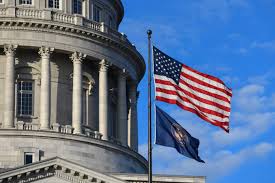
Utah – Utah’s plans to eliminate state income taxes on Social Security benefits remain uncertain, but legislative actions in the coming 2025 session could provide a clearer picture. Last month, the state’s Executive Appropriations Committee allocated $231 million for potential tax cuts, with $165 million in ongoing revenue and $66 million in one-time funds earmarked for future consideration.
The cost of eliminating taxes on Social Security benefits is estimated at $143.8 million. Governor Spencer Cox has made this proposal a centerpiece of his $30.6 billion budget, highlighting that Utah remains one of just eight states still taxing Social Security income. Cox argues that it’s an embarrassment for the state, directly affecting around 150,000 residents.
Senate Budget Chairman Jerry Stevenson expressed growing support for the proposal, stating that constituents and fellow legislators are increasingly in favor of removing the tax on Social Security. While the Republican supermajority in the Legislature has not formally endorsed the idea, Stevenson predicts that the proposal will gain traction this session.
Another income tax rate reduction is a possibility, but Stevenson cautioned that any additional cuts should be made strategically. He noted that legislative leaders have set aside more than enough money to cover the cost of eliminating the tax on Social Security, with any surplus potentially redirected to balance the budget.
Also Read – Gracie’s Kitchen Onion Recall: FDA Highlights Potential Listeria Risks
Utah lawmakers are facing budget shortfalls, including a $2.3 million deficit for fiscal year 2024 and a nearly $24.5 million shortfall in the current budget. The Executive Appropriations Committee has also added more funds to the state’s “Rainy Day” reserve to address potential shortfalls.
Governor Cox has made it clear that his priority is the elimination of the tax on Social Security, emphasizing that this measure would have a far greater impact on seniors, particularly those on fixed incomes, compared to a minor reduction in the state income tax rate. Cox argued that offering a small tax cut to all residents would pale in comparison to saving seniors a significant amount of money, such as $1,000 per year.
House Budget Chairman Val Peterson acknowledged that discussions about the specific nature of this year’s tax cuts have not yet begun. However, he clarified that while $165 million is available for ongoing cuts, only $66 million in one-time funds could be used for a temporary tax break. He also warned that one-time money cannot be used for permanent cuts, as that would create long-term budget imbalances.
This mirrors a precedent set in 1988 when Utah lawmakers issued rebate checks totaling $80 million, returning a surplus to taxpayers following a tax increase. Lawmakers will need to decide whether to use the available funds for additional cuts or consider one-time rebates for taxpayers.










